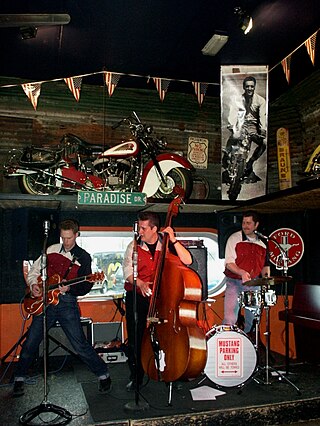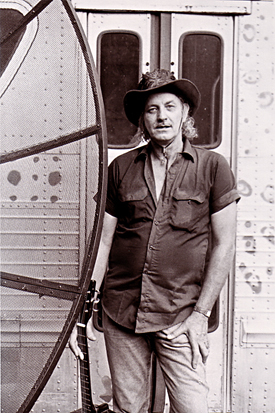Punk rock is a rock music genre that emerged in the mid-1970s. Rooted in 1950s rock and roll and 1960s garage rock, punk bands rejected the corporate nature of mainstream 1970s rock music. They typically produced short, fast-paced songs with hard-edged melodies and singing styles with stripped-down instrumentation. Lyricism in punk typically revolves around anti-establishment and anti-authoritarian themes. Punk embraces a DIY ethic; many bands self-produce recordings and distribute them through independent labels.

The Cramps were an American rock band formed in 1976 and active until 2009. Their lineup rotated frequently during their existence, with the husband-and-wife duo of singer Lux Interior and guitarist Poison Ivy the only ever-present members. The band are credited as progenitors of the psychobilly subgenre, fusing elements of punk rock with rockabilly. The addition of guitarist Bryan Gregory and drummer Pam Balam resulted in the first complete lineup in April 1976. They released their debut album Songs the Lord Taught Us in 1980. The band split after the death of lead singer Interior in 2009.
Gothic rock is a style of rock music that emerged from post-punk in the United Kingdom in the late 1970s. The first post-punk bands which shifted toward dark music with gothic overtones include Siouxsie and the Banshees, Joy Division, Bauhaus, and The Cure.
Deathrock is a rock music subgenre that merges punk rock and post-punk with gothic and glam rock visuals and elements of horror film scores. Often overlapping with, and sometimes considered a subgenre of, gothic rock, the genre was pioneered by bands from the early 1980s Los Angeles punk scene, including Christian Death, Kommunity FK, 45 Grave and the Super Heroines. By the middle of the decade, the genre had begun to interact with the United Kingdom's gothic rock scene, leading to the formation of English deathrock bands like Sex Gang Children and Alien Sex Fiend. However, soon after the genre declined in popularity, and its name largely fell out of use. In the late 1990s, a revival of the genre began, in which groups like Bloody Dead and Sexy, the Phantom Limbs and Tragic Black expanded the scope of the genre to include elements of psychobilly, electronic body music and futurepop.
Alternative country is a loosely defined subgenre of country music and/or country rock that includes acts that differ significantly in style from mainstream country music, mainstream country rock, and country pop. Alternative country artists are often influenced by alternative rock. Most frequently, the term has been used to describe certain country music and country rock bands and artists that are also defined as or have incorporated influences from alternative rock, indie rock, punk rock, heartland rock, Southern rock, progressive country, outlaw country, neotraditional country, Texas country, Red Dirt, roots rock, indie folk, folk rock, rockabilly, bluegrass, and honky tonk.

Rockabilly is one of the earliest styles of rock and roll music. It dates back to the early 1950s in the United States, especially the South. As a genre, it blends the sound of Western musical styles such as country with that of rhythm and blues, leading to what is considered "classic" rock and roll. Some have also described it as a blend of bluegrass with rock and roll. The term "rockabilly" itself is a portmanteau of "rock" and "hillbilly", the latter a reference to the country music that contributed strongly to the style. Other important influences on rockabilly include western swing, boogie-woogie, jump blues, and electric blues.
Psychobilly is a rock music fusion genre that fuses elements of rockabilly and punk rock. It has been defined as "loud frantic rockabilly music", it has also been said that it "takes the traditional countrified rock style known as rockabilly, ramp[ing] up its speed to a sweaty pace, and combin[ing] it with punk rock and imagery lifted from horror films and late-night sci-fi schlock,... [creating a] gritty honky tonk punk rock."

Cowpunk is a subgenre of punk rock that began in the United Kingdom and Southern California in the late 1970s and early 1980s. It combines punk rock or new wave with country, folk, and blues in its sound, lyrical subject matter, attitude, and style. Examples include Social Distortion, The Gun Club, The Long Ryders, Dash Rip Rock, Violent Femmes, The Blasters, Mojo Nixon, Meat Puppets, The Beat Farmers, Rubber Rodeo, Rank and File, and Jason and the Scorchers. Many of the musicians in this scene subsequently became associated with alternative country, roots rock or Americana.

The Meteors are an English psychobilly band formed in 1980. Originally from London, England, they are one of the pioneers of the psychobilly subgenre — which fuses punk rock with rockabilly — its distinctive sound and style. "Starting in the neo-rockabilly scene, the Meteors were initially shunned for being too spooky and mean. Excuses for exclusion from rockabilly concerts varied from the band having too extreme of a sound to their drummer having green hair." The Meteors blended elements of punk rock, 1960s garage band surf music, rockabilly, and horror film themes in their music and are thought to be one of the first bands to use the label 'Psychobilly' to define a genre and musical style, though the term is used as a lyrical motif as part of the narrative in the Johnny Cash and The Tennessee Three song, One Piece at a Time.

Horror punk is a music genre that mixes punk rock and 1950s-influenced doo-wop and rockabilly sounds with morbid and violent imagery and lyrics which are often influenced by horror films and science fiction B-movies. The genre was pioneered by the Misfits in the late 1970s and early 1980s. Subsequent bands formed in the Misfits' wake like Mourning Noise, the Undead and Samhain, solidifying horror punk's first wave. In the late 1990s and early 2000s the genre gained attention through the reunion of the Misfits and success of groups like AFI, Son of Sam and the Murderdolls. This popularity continued to the modern day with Blitzkid, Calabrese and Creeper.

The Legendary Shack Shakers are an American rock band from Murray, Kentucky that was formed in 1995 by J.D. Wilkes. The original line-up formed the band out of a shared interest in rockabilly, blues and Western swing. Subsequently, the band gained prominence in the alternative country scene with a sound that encompassed rockabilly, blues, country and punk rock and a lyrical focus on Southern Gothic themes. Over time, the band's sound shifted to emphasize country music.

Hasil Adkins was an American singer-songwriter and multi-instrumentalist. His genres include rock and roll, country, blues and more commonly rockabilly, and because of his unusual playing and singing style, he is often cited as an example of outsider music. He generally performed as a one-man band, playing guitar and drums at the same time.

Kustom Kulture is the artworks, vehicles, hairstyles, and fashions of those who have driven and built custom cars and motorcycles in the United States of America from the 1950s through today. It was born out of the hot rod culture of Southern California of the 1960s.

Southern Culture on the Skids, also sometimes known as SCOTS, is an American rock band from Chapel Hill, North Carolina.

Erick Lee Purkhiser, better known by the stage name Lux Interior, was an American singer and a founding member of the American rock band the Cramps from 1976 until his death in 2009 at age 62.
The Sting-rays were a British rock band from Greater London which recorded on Ace Records' garage and psychedelic subsidiary Big Beat and Joe Foster's Kaleidoscope Sound in the 1980s.

Bigger Life is the ninth studio album and eleventh album overall by American ska-swing band the Cherry Poppin' Daddies, independently released on Space Age Bachelor Pad Records on June 14, 2019.











